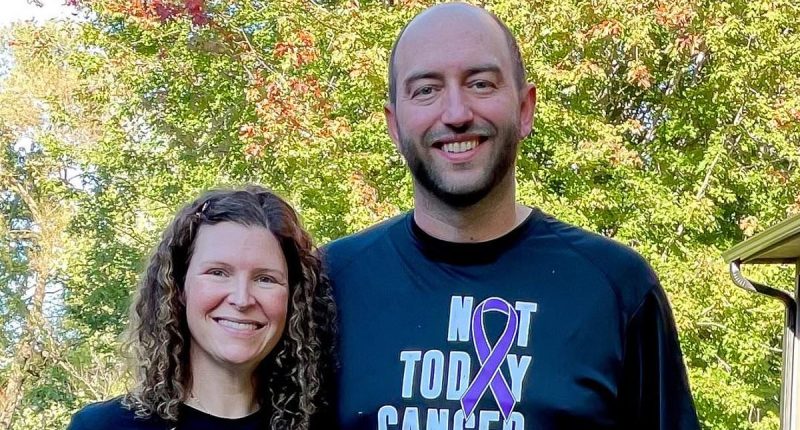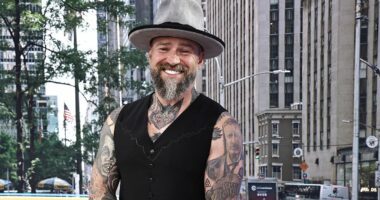Share this @internewscast.com
An Oregon man who blamed his extreme fatigue and weight loss on work stress actually had terminal cancer.
Once an ultramarathon champion and self-proclaimed ‘health nut,’ the 41-year-old had grown accustomed to intense weight training and running up to five miles a day.
He mostly steered clear of alcohol and processed foods and prioritized a balanced diet with all organic vegetables and lean proteins.
But earlier this year, he noticed he could no longer get through his regular exercise routine – ‘the first big change’ that signaled a deadly issue.
Over the course of several months, he suffered extreme fatigue and dropped 30 pounds without trying.
‘I thought it was just stress at work,’ the mechanical engineer said.
However, bloodwork and an abdominal CT at his yearly checkup revealed stage four pancreatic ductal adenocarcinoma, the most common form of pancreatic cancer.
Just one in eight patients with pancreatic cancer is expected to survive five years, data shows, and when it’s diagnosed in later stages, which happens most of the time, survival rates dwindle to just three percent.

Ryan Dwars of Iowa (pictured here with his wife and two children) was diagnosed with pancreatic cancer in 2021 after suffering pain down his left side that radiated to his chest

The National Cancer Institute estimates that just over 44 percent of pancreatic cancer patients survive more than five years if the condition is still localized to its original area. It has an average survival rate of 12 percent
The man, who posted his story in an anonymous Reddit thread, has just six months left to live despite living ‘a very healthy lifestyle’ and having no family history of the disease.
He said: ‘I never smoked, almost never drank, ate clean and exercised daily. Sometimes biology lets you down.’
Pancreatic cancer affects roughly 67,000 Americans every year and kills about 52,000.
More than half the time, the disease is first spotted after it has already reached stage three or four due to its vague symptoms. These include abdominal pain, weight loss, back pain, jaundice and floating or clay-colored stools.
This leads patients to assume their symptoms are from more benign causes like irritable bowel syndrome (IBS).
This was the case for Clair Honeywood, a 45-year-old from the UK who chocked her severe stomach pain up to IBS. She was diagnosed with inoperable pancreatic cancer and given a year to live.
And Matthew Rosenblum of Michigan assumed his bone-white stools in 2021 were from Crohn’s disease, but it was actually stage four pancreatic cancer at age 32.
It’s unclear exactly what causes pancreatic cancer, but smoking, obesity and diabetes are thought to increase the risk by inducing harmful inflammation that causes cells to divide and become mutated more easily.
The man in the Reddit thread, however, blames his diagnosis on bad luck.
He said: ‘Before this diagnosis, I was in perfect health. I thought I had another 50 years left. The first thought was “This is too soon.”’
The former engineer said he will soon move into hospice care and try psilocybin therapy for pain and the mental health effects that have come with his diagnosis.
Psilocybin, the psychoactive ingredient in magic mushrooms, has been thought to reduce anxiety and depression in cancer patients.
He also has signed up for several clinical trials. It’s unclear if he will be getting standard treatments like chemotherapy or radiation.


Clair Honeywood (left), 45, was diagnosed with pancreatic cancer at stage three after mistaking her symptoms for IBS. Matthew Rosenblum, meanwhile, thought his bone-white stools were from Crohn’s disease

Early signs of pancreatic cancer include jaundice, stomach pain, back pain, weight loss, and floating stools
For now, he is focusing on using up his savings on vacations, scuba diving, skydiving and other items on his bucket list.
His main regret is not taking enough risks like ‘starting a business, moving to another place, trying something you were interested in but didn’t know if you could do.’
‘In the end, your failures are often not as consequential as you might think,’ he added.
He said: ‘I’m glad I’ve been able to experience life. In all the possible realities I could’ve existed in, this was a pretty good one. Even if it’s short.
‘I don’t have any grandiose aspirations for my legacy. A simple “that guy was alright” is good enough for me.
‘The biggest piece of advice I would give is to not take the time you have for granted. I know that’s probably a worn out statement, but it rings incredibly true when you realize how finite your life really is.’















